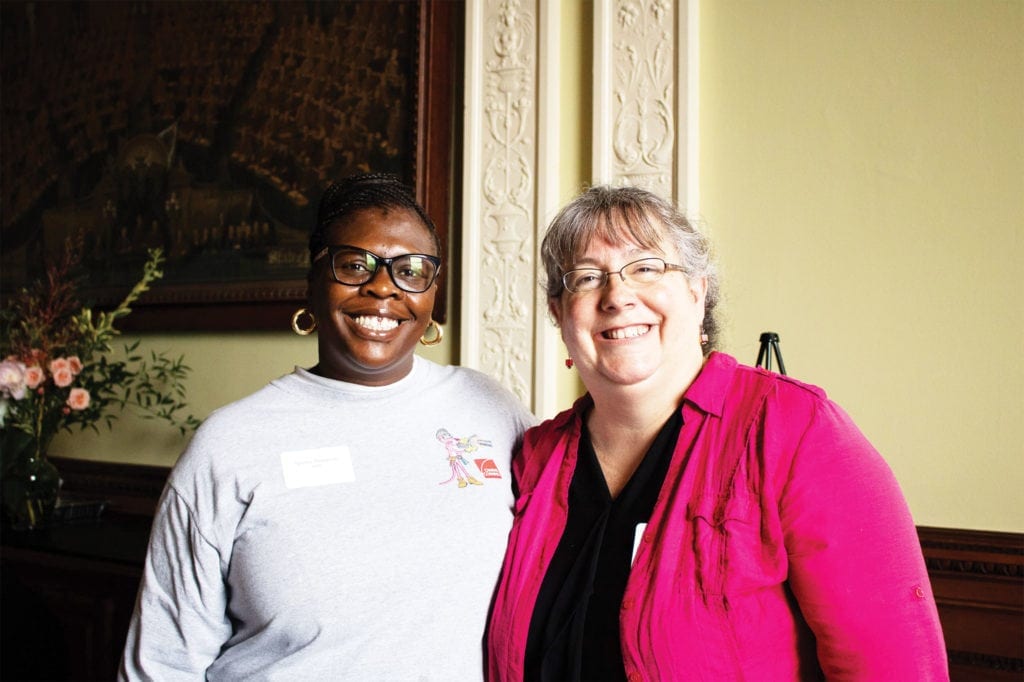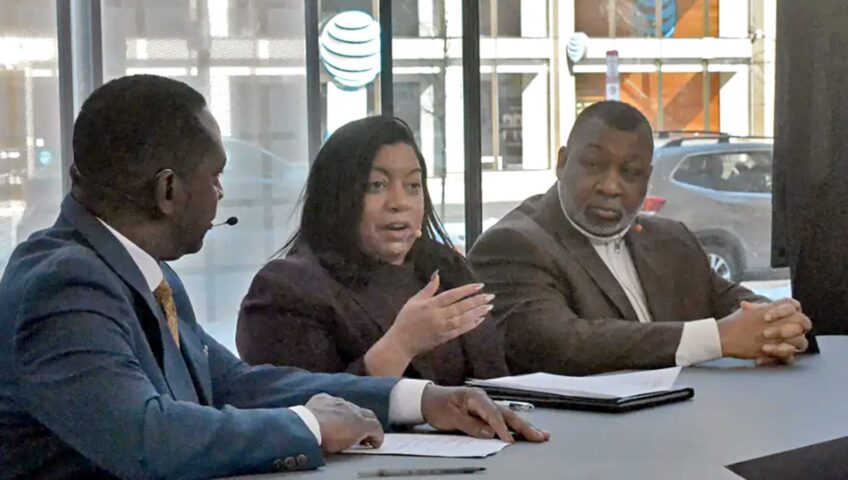
When Tyiesha Thompson became a member of the Insulators Local #6 trade union and began working on construction sites six years ago, the single mother of three had achieved one major step toward supporting her family — earning a living wage. The only hitch was, with shifts that often began at 6 a.m., she could find no childcare options that matched her schedule.
It took creativity to cobble together an evolving web of care to ensure her sons — age 16, 9 and 1 at the time — got to their schools and daycare centers safely and on time.
Her daycare center provided transportation, but not until 8 a.m. So, she trained her eldest son to put the toddler on the daycare bus just before catching his own school bus. But after the teen went off to college, she had to enlist a neighbor to keep her little one from 5 a.m. until the daycare bus time. Today, the middle son can wait with his younger brother for the school bus, but that causes him to arrive late at high school — so Thompson pays a neighbor $50 per week to drive him the 1.2 miles to school.
Thompson is one of many workers for whom “non-traditional” hours are the norm. Workers in construction, health care, custodial and hospitality sectors — some of whose hours change week-to-week with little notice — are hard-pressed to locate any daycare facility or before- and after-school care that fits their schedule.
Thompson told her story last week at the State House during a legislative briefing co-hosted by Community Labor United and Brookview House, a Dorchester organization that offers housing, youth programs, job training and other services to mothers and children experiencing or at risk for homelessness.
“Childcare is so vital. We can’t move unless our children are secure,” Thompson said. “If there’s no daycare service open at 6 o’clock to take my child, I have to find other care every day before daycare starts.”
Addressing the dozen or so legislators and legislative aides who attended the lunchtime briefing along with community members and labor and justice advocates, she concluded, “So if you could help us push to get access to childcare early in the morning and late at night, it would help us out tremendously.”
Cost and access issues
For the advocacy groups, the State House briefing is an annual event convened for the purpose of engaging legislators and planting seeds for the following year around issues and priorities important to low-income, homeless and struggling families.
Rep. Russell Holmes, who co-sponsored the luncheon event with Rep. Liz Malia, introduced the session and some of the key issues.
“Family homelessness is a severe and escalating issue in Massachusetts,” he said, noting that the issue is exacerbated by both lack of affordable housing and lack of affordable childcare.
In order to rise out of homelessness, mothers need childcare options that allow them to go to training and jobs.
One set of interconnected problems is the high cost of childcare, long waitlists for state-funded vouchers that subsidize this cost for low-income families, and the difficulty in qualifying for a voucher in advance of starting job training, school or employment.
“Childcare is a ‘Catch-22,’” noted Deborah Hughes, president and CEO of Brookview House. “You need childcare to go to work or training, but you can’t get a childcare voucher unless you’re in a job or educational or training program.”
As a result, she said, “People have to choose between childcare and work. We have to do better.”
Group effort
Darlene Lombos, executive director of Community Labor United, spoke of a new coalition called Care that Works, in which partner organizations are collaborating to tackle the myriad problems of job training, employment, living wages and sufficient childcare options.
One project of the Care that Works campaign is the Independent Women’s Project, focused on creating pipelines into the construction and hospitality industries with the support of childcare during the appropriate hours.
At the event, speakers cited data collected in a new policy brief released by Care that Works. The brief indicates that 42 percent of Massachusetts low-income children under 13 have parents who work when most licensed childcare providers are not open; more than 70 percent of young parents have work hours that change week-to-week; an estimated 60,000 parents quit, change or turn down jobs each year because of a mismatch between work hours and childcare options.
What’s more, those whose work is providing childcare have their own struggles to keep their businesses afloat, making the odds even lower that they can or will expand their services to accommodate nontraditional or changing work schedules.
The policy brief calls for stronger state investments in the care sector to allow childcare options around the clock and sustainable wages for care providers as well as supports for working families such as fair scheduling rules and paid family and medical leave.
Partners in the Care that Works initiative include CLU; Brookview House; Building Pathways, which prepares people for construction industry careers (and was the program that propelled Tyiesha Thompson into her trade); Boston Education, Skills & Training (BEST) hospitality training organization; SEIU Local 509; UAW Local 1596; New England United for Justice; and the Policy Group on Tradeswomen’s Issues.






